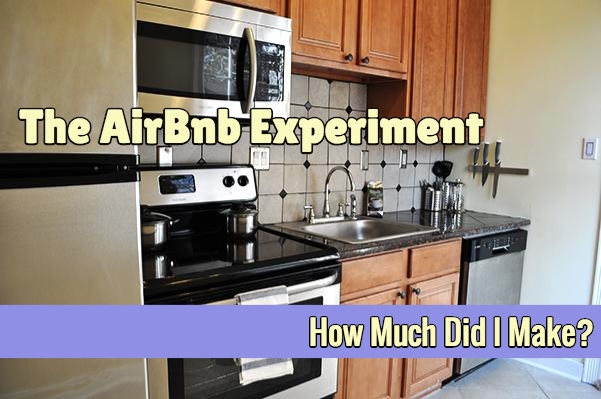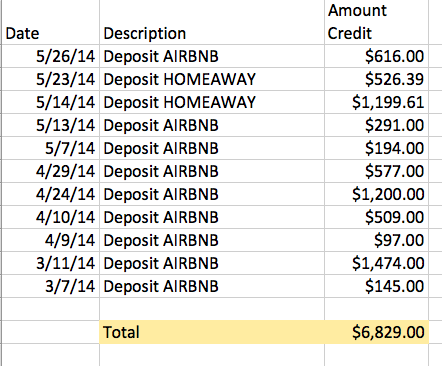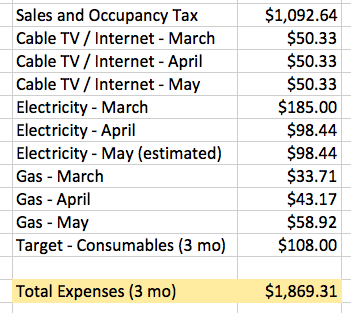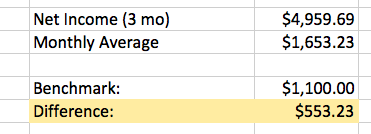
This article is Part 2 of The Airbnb Series. Start by reading Part 1 here, and when you’re done, visit Part 3 and Part 4.
Three months ago, I launched The AirBnb Experiment.
I’m trying to satisfy a long-held curiosity: How much more (or less) could I earn by running an Airbnb vacation rental, as compared with traditional landlording?
My subject property: a luxury one-bedroom apartment in a prime Atlanta location.
I’ve owned this property for three years. I could rent it to a traditional, long-term tenant for $1,100/month. Instead, I’m offering it as a short-term vacation rental on Airbnb and VRBO.
Will I make money hand-over-fist?
Will I lose my shirt?
Here’s how the experiment shook out:
Occupancy
My biggest fear is massive vacancy rates. As any landlord could tell you, nothing is more expensive than vacancy.
Fortunately, that fear is unfounded.
The apartment is fully booked from April through September, and I’m already fielding inquiries into October and November, from guests trying to reserve the apartment 4-5 months in advance.
Score!
There’s an expression among landlords: “If your occupancy is 100 percent, your rent is too low.” Borrowing a page from that playbook, I decided to raise my rates from $75/night to $99/night.
(Update Spring 2015: I’ve raised the room rates again; it’s now between $125 to $155 per night.)
Every guest pays an additional $75 cleaning fee, regardless of the length of their stay, and puts down a $150 refundable security deposit. An extra guest is $5/night, and pets are $10/night.
Guest Quality
There’s one risk that’s even more expensive than vacancy: destruction.
If your guest trashes your home, you could (theoretically) lose tens of thousands. The newspapers report horror stories of Airbnb guests who throw wild orgies.
Fortunately, this apartment is orgy-free. (Should that become its new slogan?) The guests are top-notch, worldly and fascinating.
Actors – The apartment is close to the Fox Theater, a gorgeous 4,700-seat performance venue. As a result, I’m getting a ton of interest from members of Broadway touring ensembles – so far I’m playing host to cast/crew members from The Lion King, Wicked, and Phantom of the Opera.
Artists – The unit is also two blocks from Piedmont Park, a popular festival venue known as the “Central Park of Atlanta.” This means I’m hosting many artists and craftsman: entrepreneurs who traverse the nation, selling homemade organic soaps or recycled clocks at summertime festivals (and making a decent dime).
Travelers – And of course I’m getting my fair share of “traditional” vacationers – people who want to visit the biggest city in the South, excited to spend a weekend dining at posh restaurants, drinking fancy wines or crafted cocktails, dancing at concerts, and doing all kinds of other city-stuff.
Issues
In fairness, I need to share the downsides, as well. First and foremost, vacation rental management is harder to outsource.
Here was my initial thinking:
- Step 1: Develop systems and processes. Example: “Here’s the cleaning checklist: wash sheets, empty trash cans, dust, mop, vacuum, etc.”
- Step 2: Hire housecleaners to manage the turnover.
- Step 3: Maintain a “supply closet” filled with toilet paper / coffee filters / etc., to reduce the number of trips to the store.
- Step 4: Communicate with guests through the smartphone app.
- Step 5: Have a mostly-hands-off business. I’ll still field inquiries, which would take about 30 minutes per week (5-10 minutes/day, a couple days per week), but the rest would be systematized.
Or so I thought. Reality had different plans.
I’ve created these processes for my rental properties (as a traditional landlord), and it’s worked like a charm.
My traditional rental properties – after they’ve been renovated – are totally passive. I just kick back and watch the money roll in. (Buying and renovating the properties is a massive pain-in-the-ass, but the aftermath is glorious.)
Unfortunately, vacation rentals aren’t as hands-off. Here are some of the issues I’ve had to troubleshoot:
Issue #1: Consumables.
Humans need a lot of crap. We need soap, shampoo, tea, coffee, cooking oil, toilet paper, dishwashing liquid, laundry detergent, trashcan liners, bags of ice.
These are “consumables” – meaning that they need constant restocking.
I figured I’d keep a “supply closet” within the apartment. Bad idea.
As it turns out, people steal from supply closets. I’m a little flabbergasted that someone would pay $600 for a one-week vacation, and siphon away a $5 container of laundry soap – but that’s how life shakes out.
What’s strange is that nobody steals the “indefensible” stuff – pots, pans, the TV. That’s too flagrant. But “consumables” seem to be viewed in some morally-ambiguous zone.
This doesn’t happen with all guests, of course. Only a few. But after you lose enough 4-packs of toilet paper, you start thinking that maybe you should keep your supply closet locked up.
Issue #2: Finding Reliable Workers
Of course, the restocking issue isn’t a huge deal. Just create a checklist for the housekeeper, which includes a line-item: “Check quantities of soap/sponges/etc. Resupply as needed.”
List each specific item, with a check-box next to it. House the supply closet in a locked trunk, and include a set of keys. Voila – you’re done.
That would be great … if I could find a reliable housekeeper.
You see, here’s the crux of the problem:
Check-out is at 11 a.m., which means realistically, people leave at 12 noon. Check-in is at 3 p.m., which means realistically, people arrive at 2 p.m.
That leaves a tight window of time to process the turnover. And unfortunately, I’ve had trouble finding punctual cleaners.
My two attempts failed miserably.
The first cleaner showed up a whopping six hours late – long after the next set of guests had already checked in. I cleaned the apartment myself, and sent her home when she arrived.
I tried again a few weeks ago, when I spent the weekend at a South Carolina beach. I had a turnover scheduled on the last day of my vacation. I scheduled a cleaner, and re-confirmed our appointment a day or two beforehand.
She never showed up. Boo!!
The new guests called me to complain that they’d checked-into a dirty unit: dishes in the sink, unwashed sheets on the bed. I received the call as I was driving home from the beach, several hours away – and felt totally helpless. All I could do was apologize profusely and slam the accelerator.
In those moments, I wonder: “Is this really worth it?”
Then I crunch the numbers, look at my “hourly rate,” and think, “Hell yeah.”
Income
During the past 3 months, I’ve grossed $6,829 through this vacation-rental – an average of $2,276 per month.
If I projected that out, I’d be grossing $27,300 per year on just this single apartment alone.
On the surface, that sounds awesome. But let’s look at the expenses.
In the past three months, vacation-rental expenses** totaled $1,869, with the biggest chunk getting consumed by sales and occupancy taxes (hotel taxes).
That leaves me with a net income of about $5,000 in the past 3 months, which averages $1,653 per month.
Is that good or bad? It depends.
No investment is “good” or “bad” in a vacuum. Every investment should be compared to the next best alternative.
In this case, the “next best” is the rent I’d collect from a traditional one-year lease.
The apartment would rent for $1,100 per month, which means that I’m capturing $553.23 more than I otherwise would.
In other words, I’m earning an extra $553 per month by running an impromptu “bed and breakfast” rather than landlording over a traditional tenant.
How much extra work does that entail?
Not much.
Answering inquiries is easy – I reply to emails through my phone. It’s about as much of a hassle as checking Twitter or posting to Facebook. Time commitment: negligible.
Meeting guests is unnecessary. I just leave the housekey hidden in a nearby spot. The Airbnb website automatically emails the guests directions and key location. Result: The check-in process is totally hands-off.
Playing tour-guide is automated. I wrote a “Welcome Guide” that offers the guests tips on the best places nearby to eat, drink, shop, etc., along with directions on how to get there by walking, bicycling, train, bus and car. The “welcome guide” also includes tips about the apartment (e.g. “this is how to operate the thermostat”) and the Wifi password.
Automation rocks, y’all.
The biggest hassle is turnover. Cleaning the apartment takes about 1.5 hours, and happened 11 times in the past 3 months (3.6 times/month). That means cleaning takes 5.4 hours/month. Let’s round the total time commitment up to 6 hours/month, to include emails and other ancillary tasks.
Time: 6 hours/month
Extra Income: $553/month
Hourly Rate: $92/hour
Not bad, if I say so myself.
What’s Next?
I’m stoked that the “extra income” has almost paid-off the cost of furnishing the apartment (about $2,000). Now that I’ve nearly recouped those initial startup costs, everything else is pure profit.
(By the way, is this the only investing blog that uses words like “awesome,” “stoked” and “orgy-free?”)
Since The AirBnb Experiment is holding strong – and demand is high – I’m going to keep truckin’ for the next few months.
Will demand slump in the winter?
Will my new-higher-prices scare people away?
Check out Part Three of The Airbnb Series to find out.
Use this estimator tool to find out how much you could earn as an Airbnb host.
Airbnb makes it easy to put your extra space to work for you. Become a host today, and you can start boosting your income!
P.S. Are you wondering about the basic costs of running a property, like the mortgage, insurance and property taxes? Those numbers stay the same, regardless of whether I’m renting the apartment as a vacation-rental or as a traditional one-year lease. Therefore, they’re not included in the The Airbnb Experiment spreadsheets.
But if you’re new to Afford Anything and you’re curious to learn more, don’t worry: I’m totally transparent about my income/expenses from every rental property.
Here’s how much I earned & spent for House #1, House #2, House #3, House #4 and House #5 – read on for the juicy details.


